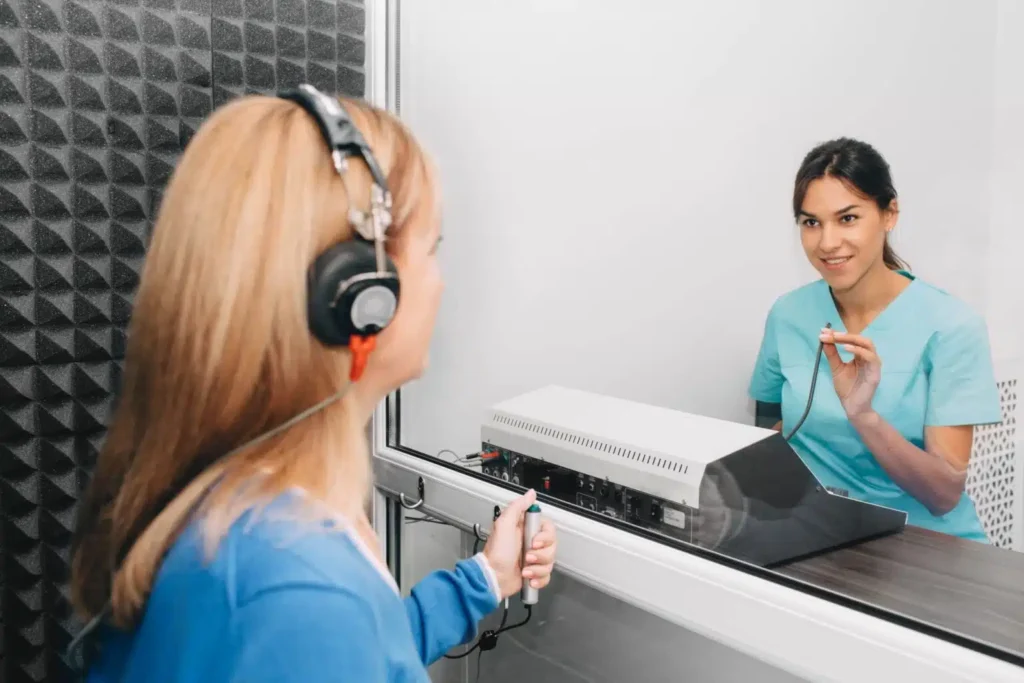When it comes to health and wellness, most people are familiar with routine screenings like vision exams, blood pressure checks, cholesterol testing, or even dental cleanings. However, one critical area of health that often goes overlooked is hearing. Audiometric testing—an evaluation of a person’s hearing ability—is a powerful yet underutilized tool in both preventive health care and workplace safety. Whether you’re an employer concerned about employee wellness, or an individual mindful of aging and sensory health, audiometric testing deserves your attention.
What Is Audiometric Testing?
Audiometric testing is a clinical procedure used to assess an individual’s hearing ability across a range of frequencies. It’s typically performed by trained professionals using specialized equipment in a soundproof environment. The test is painless, non-invasive, and takes just a few minutes to complete.
There are two common types of audiometric tests:
- Pure-Tone Audiometry: Measures the softest tones a person can hear at various pitches or frequencies. Test subjects wear headphones and press a button when they hear a sound.
- Speech Audiometry: Measures the ability to detect and understand speech at different volume levels, which helps evaluate how well someone can process spoken language in everyday situations.
These results are plotted on an audiogram, which provides a visual representation of hearing thresholds across different frequencies.
Why Is Audiometric Testing So Important?
1. Early Detection of Hearing Loss
Hearing loss often occurs gradually. Many people don’t even realize there’s a problem until they begin missing important details in conversations, struggle with background noise, or experience ringing in their ears (tinnitus). Routine audiometric testing allows professionals to identify subtle changes in hearing early, sometimes before the individual is even aware of a problem.
Early detection is critical. Addressing hearing loss at an early stage makes it more manageable and improves treatment outcomes. In many cases, preventive strategies or hearing aids can significantly enhance quality of life.
2. Workplace Safety & Regulatory Compliance
In high-noise work environments such as construction, manufacturing, aviation, or landscaping, hearing protection is not just good practice—it’s required by law. The Occupational Safety and Health Administration (OSHA) mandates that employees exposed to an average noise level of 85 decibels (dB) or more over an 8-hour shift be enrolled in a hearing conservation program. This includes baseline and annual audiometric testing.
Routine audiometric testing helps employers:
- Monitor hearing over time
- Identify shifts in hearing thresholds
- Take corrective action to reduce noise exposure
- Stay compliant with OSHA regulations
- Reduce the risk of workplace injuries related to poor communication or missed auditory cues
3. Prevention Through Monitoring
Audiometric testing isn’t just reactive—it’s preventive. By establishing a baseline and tracking changes over time, hearing specialists can detect patterns and offer early interventions. These may include custom hearing protection, changes in workplace equipment, or even medical referrals.
Monitoring hearing regularly gives individuals and employers a better understanding of the risks and how to reduce long-term damage. This proactive approach is more effective and less costly than trying to manage advanced hearing loss down the line.
4. Better Communication and Quality of Life
Hearing is essential for everyday communication, social interaction, and overall well-being. Untreated hearing loss has been linked to:
- Increased feelings of isolation or depression
- Cognitive decline in older adults
- Misunderstandings in professional and personal settings
- Safety risks due to missed alarms, honking, or verbal warnings
Audiometric testing helps safeguard your ability to connect with others and engage confidently in your environment. For aging adults, it’s an essential part of staying independent and maintaining a high quality of life.
5. Support for Legal or Insurance Claims
In workplaces where noise exposure is a concern, maintaining accurate and up-to-date audiometric records is key to protecting both employers and employees. In the event of a hearing loss claim, these records can:
- Prove compliance with safety standards
- Establish whether hearing loss was work-related or pre-existing
- Provide crucial data in the event of legal or insurance disputes
This documentation can make all the difference in how claims are handled and resolved.
Who Should Get Audiometric Testing?
Audiometric testing isn’t just for factory workers or seniors. It can benefit a wide range of people, including:
- Employees in noisy industries (construction, agriculture, aviation, etc.)
- Individuals over age 50
- Musicians or concert-goers
- People who regularly use headphones or earbuds at high volumes
- Anyone experiencing signs of hearing loss: difficulty understanding speech, ringing in ears, or frequently asking others to repeat themselves
If you fall into any of these categories, getting your hearing tested regularly is a smart health decision.
How Often Should You Get Tested?
- Baseline Test: At the start of a new job with high noise exposure or once you turn 50.
- Annual Testing: For workers in noisy environments or those with risk factors.
- Every 2–3 Years: For adults with no significant risk factors or symptoms.
Consulting a hearing health professional can help determine the best schedule for your needs.
Final Thoughts
Hearing is a sense that often gets taken for granted—until it’s diminished or gone. Audiometric testing offers a simple, effective way to protect one of your most valuable senses. Whether it’s for occupational safety, personal health, or aging well, routine hearing tests are a vital part of proactive care.
Need to schedule an audiometric test for yourself or your team?
We offer professional, OHS-compliant audiometric testing tailored to both individuals and organizations. Contact us today to learn more and take a confident step toward protecting your hearing health.
